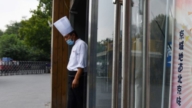【新唐人2013年10月05日訊】據英國《路透社》報導說,中共中央政府從2010年開始,啟動一個全國性數字化房地產數據庫,它將使得用戶可以查詢一個人擁有多少房地產以及有關房屋的細節。但是這個計劃遭到地方政府的反對。大陸學者分析,數據庫的建立,是中共迫於民意,反腐保黨的需要,以及解決房市泡沫日趨嚴重的手段,而地方政府既不希望中央干預它的土地財政,官員也懼怕因此財產被曝光。
《路透社》10月2號的報導引述行業專家的分析說,數據庫不僅被當局視為控制房市泡沫,而且是迫使腐敗地方官員交代使用非法所得購買房產的關鍵。
湖北作家阮雲華:「數據庫一旦建立,官員的財產就必然公開化。這是從數據的角度逼迫他們公開財產。他們當然不會上這個當,所以他們拒絕配合這個政策。他們這樣做就可以慾蓋彌彰,始終讓老百姓不知道他們的財產。」
行業專家說,位於計劃書之列的40個大城市拒絕簽署,直到住建部同意他們披露的信息不會公開之後。數據庫計劃的第二階段,本來應該在六月份完成並且包括500個更多城市,但還沒有獲得結果。
房地產數據,儘管有利於房地產市場,但是對試圖隱藏多處豪宅的官員來說構成威脅。
在最近幾個月,作為公務員不可能購買得起多套房產,而被曝光出來的大陸地方官員不在少數。著名的有「房叔」和「房姐」。他們已經成為公眾憤怒的目標。
在一個特別高調的案件當中,廣州市一名城市管理官員蔡彬,擁有超過20棟房屋,去年十月被撤職。政府發給他的薪水一個月僅僅1萬元。
即使建立了數據庫,數據的真實性也需要打一個問號。湖北作家阮雲華說,特別是一些高官,他可以有幾個身份證,所以房產最後的登記入庫信息也未必是真實的。
阮雲華:「政府提出要建立數據庫應該是為了迎合民心,但是它提出來最後沒建立,或者建立的進度始終緩慢,就像政府每天都在反腐,每天都要官員公布財產,但是這個制度始終沒建立,始終拖著,一方面又緩和了民眾的迫切心理,一方面又達到自己的目的,不斷拖延時間,為最終洗白財產贏得時間。」
河南許昌市房地產投資顧問鄭志遙認為,地方政府對數據庫的抗拒主要是因為不願意中央干預它的土地財政,擔憂中央打壓房地產泡沫損害地方經濟發展。
鄭志遙:「哪個地方政府也不願意自己政府的房地產崩盤,也不願意自己這個地方辛辛苦苦搞的樓盤,那麼多再建項目變成爛尾工程變成鬼城,對地方政府的壓力很大,造成地方銀行的壞賬,因為房地產不是一個行業,後面還有土地,還有建材,就業,稅收,這都和政府的財政稅收緊密相連的。」
鄭志遙透露,地方官員和房地產商為了中飽私囊,採用虛假手段推高房地產泡沫。
鄭志遙:「地產商房子蓋完了之後,並不是賣給客戶了。一部份是賣了、一部份是抵押給銀行了、還有一部份是房地產商自己內部員工變相購買,然後等賣一部份,再把這一部份虛假的購房,他們購完之後,拿這個去抵押貸款。其實就是房地產商自己買自己的房子,然後抵押給銀行再去貸款,然後進行下一個樓盤的運作。」
鄭志遙說,房地產的不健康,房地產的泡沫化,指的就是這一部份,它完全是資金在空轉,產生的泡沫就是把房價推高,把風險轉嫁給銀行和市場。
中國僅有的房屋普查是在1986年完成,它在2010年搞的經濟普查沒有包括房屋調查。今年的經濟普查也不會包括。許多城市也缺乏歷史性置業數據。
採訪編輯/秦雪 後製/孫寕
Local Governments Against Central Real Estate Database
British Reuters reported that in 2010, the CCP Central
government planned to start a nationwide real estate database
which would allow users to check how much real estate
a person owns and other housing details.
But the plan met with opposition from local governments.
Mainland scholars analyze that the database creation is more
out of a sense of forced obligation due to
he anti-corruption campaigns.
It’s also a solution for the increasingly serious
housing bubble.
But, the local government doesn’t want the central
government to intervene in local land finance.
Officials have concerns that their property
will also be exposed.
October 2, Reuters, quoting expert analysis, reported that
the database is not the only way to control the housing
bubble, but it is the key to force the local corrupt officials
to confess how they buy property using illicit income.
Hubei writer Ruan Yunhua: “The officials’ assets have
to be public once the database is established.
It’s the way to force them to make assets public
from a data perspective.
They wouldn’t be fooled and refuse to cooperate
with this policy.
They intended to hide their assets from citizens,
but it is in vain."
Domain experts said officials from 40 cities were listed
in the proposal as refusing to sign
until the Housing Department agreed not
to publicize their information.
The second phase of the Database plan should be completed
in June which includes 500 more cities;
but there are no results so far.
Real estate data is favorable to the real estate market,
but a threat to the officials who try to hide several houses.
In recent months, many Mainland officials have been
exposed.
They won’t be able to afford several pieces of real estate
as civil servants.
The famous “room uncle" and “room sister” have become
the target of public anger.
In one particularly high-profile case, a Guangzhou city
Administrator, Cai Bin, was dismissed in October
due to owning more than 20 houses.
His monthly salary is only 10 thousand RMB.
Data authenticity is questioned even though the database
has been established.
Ruan Yunhua said some senior officials can have several
identity cards, so the final registration
of real estate information is not necessarily factual.
Ruan Yunhua: “The database establishment proposal
by the Government is to cater to people.
But the proposal hasn’t been done or the progression is as slow,
as the government’s anti-corruption every day or public official’s
assets every day.
The unconstructed system cannot ease the people’s urgent
psychological attention, but only gains more time
for themselves to make it legal."
Xuchang real estate investment adviser Zheng Zhiyao
thinks that the local government’s resistance to the database
establishment is mainly because it is reluctant to let
the central government intervene in the local land finance.
They have concerns that the central government bursting
the realestate bubble will impact local economic development.
Xuchang City real estate investment adviser Zheng Zhiyao:
“No local governments want to see their real estate crash,
suspended construction projects, or even a ghost town.
It will result in more pressure on the local government
and bad debts to local banks.
Because real estate is not isolated, it has land, building
materials, employment, taxation behind which are related
to government finance and tax income."
Zheng Zhiyao revealed that local officials and real estate
developers use fraudulent means to increase
the real estate bubble to line their own pockets.
Zheng Zhiyao: “The finished houses are not all sold
to the customers.
One part is sold to customers; another part is mortgaged
to the bank; the internal staff will buy the rest disguised
as false buyers.
It actually means the real estate companies buy their own
house, mortgage to the bank, go to the loans,
and then proceed to the next real estate operation."
Zheng Zhiyao said that unhealthy real estate and the real
estate bubble refer to this part—complete idle funds.
The resulting foam is to increase house prices and pass
the risk to the banks and markets.
The China housing census of 1986 is the only
completed census.
The economic census in 2010 did not include
the housing census.
This year’s economic census will not include
the housing census either.
Many cities also lack historic housing census data.




























